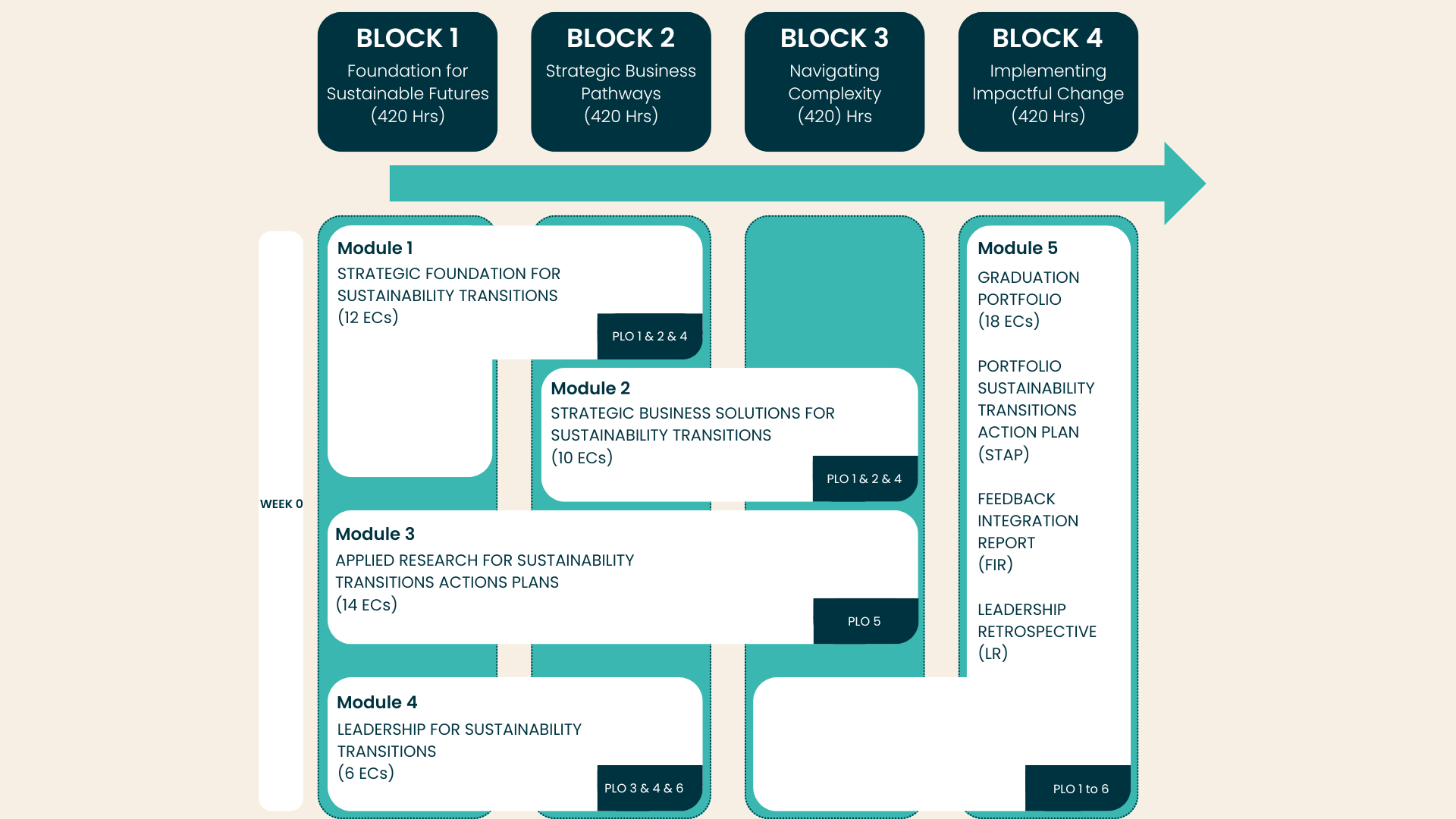Facts and figures
The programme at a glancePart of School
Programme structure
A view of the study programmeRotterdam Business School's Master programmes are built on three pillars:
- An innovation-driven, challenging real-life study environment
- An international collaboration
- A flexible learning environment
You will develop knowledge and practical tools to understand and address complex sustainability challenges from multiple perspectives. You’ll learn how to shape energy transitions, build circular business models, and implement sustainable strategies.
This programme combines practice, research, and leadership. You will work on real-life cases from existing organisations, develop evidence-based solutions, and strengthen your transition skills.
You can expect approximately 13 hours of contact time per week and about 28 hours of self-study.

The STR master is structured around five interlinked modules, each designed to build the knowledge, skills, and attitudes required to drive sustainability transitions. The curriculum combines applied research, professional collaboration, and personal development—embedded in real-world challenges across sectors and systems.
You build a strong foundation in transition theory, systems thinking, and the root causes of unsustainability. You learn to analyse complex challenges from multiple stakeholder and disciplinary perspectives.
You work with societal partners to co-design strategic interventions using tools such as benchmarking, scenario planning, and circular business modelling. You develop the skills to align organisational and sectoral strategies with transition goals.
You develop and apply research skills to generate actionable insights for real-world transition cases. Your research contributes directly to your professional action plan and builds your capacity to navigate complexity with evidence.
You strengthen your leadership identity and transition skills. Through reflective practice, communication training, and collaborative learning, you prepare to lead change in uncertain and dynamic environments.
You integrate your learning into three final outputs: your Sustainability Transitions Action Plan (STAP), a Research Dossier, and a Leadership Retrospective.
Together, these demonstrate your ability to research, act, and lead at master’s level in real sustainability transition contexts.
Learning in STR is active, collaborative, and real-world driven. You will work in small, international teams using challenge-based learning to tackle complex transition issues. Courses blend seminars, interactive workshops, field visits, and guest lectures from practitioners and researchers.
You will engage with real organisations through the Transition Action Lab, case work, and applied research projects. Learning is guided by experienced lecturers, researchers, and stakeholders from the public and private sectors. Reflection, peer feedback, and portfolio development help you track your progress and prepare for impact in your future career.
Throughout the STR master, you will develop a unique combination of knowledge, skills, and attitudes (KSA) required for navigating sustainability transitions. You will acquire applied knowledge in transition theory, systems thinking, energy and circular economy strategies, and policy frameworks.
You will also develop key professional skills such as analytical thinking, stakeholder engagement, research design, and strategic communication. At the same time, the programme fosters attitudes essential to working in sustainability: openness to complexity, reflexive leadership, ethical reasoning, and resilience in uncertain environments.
KSA development is integrated throughout the modules and culminates in your Graduation Portfolio, where you demonstrate your mastery by applying all three dimensions to a real-world challenge.

The Master Sustainability Transitions (STR) is part of a national movement to strengthen applied sustainability education across the Netherlands. Within this coalition, STR holds a unique position: it is rooted in Rotterdam, a city that serves as a living lab for transition challenges in energy, mobility, circular economy, and inclusive innovation.
This dynamic urban environment is your playground for experimentation and learning—but the ambition goes far beyond the local scale. The global nature of sustainability transitions requires professionals who think systemically, act collaboratively, and lead with purpose.
STR prepares you to become a transition catalyser: someone capable of navigating complexity, connecting sectors and disciplines, and taking action—wherever change is needed. Whether your path leads to business, government, or civil society, this programme equips you to make a meaningful contribution to a just and sustainable future.
After your study programme
Different possibilitiesCongratulations! You have earned your Master’s degree in Sustainability Transitions and will receive the title Master of Science (MSc).
With your diploma, you will receive a diploma supplement with a DS label. This English-language document makes it easier to demonstrate the value of your degree abroad, whether for admission to further studies or in your job search.
You will be prepared for a meaningful career in sustainability. Possible roles include sustainability consultant, circular economy advisor, energy transition strategist, or policy and governance expert. With your ability to manage complexity, engage diverse stakeholders, and translate knowledge into action, you can contribute to systemic change in business, public policy, or research. Alternatively, you may pursue further academic development or enter strategic leadership positions.
Discover the skills and key competencies you’ll gain during the master’s programme.
Practical information
What you need to knowLocation Kralingse Zoom
Where you can find us





